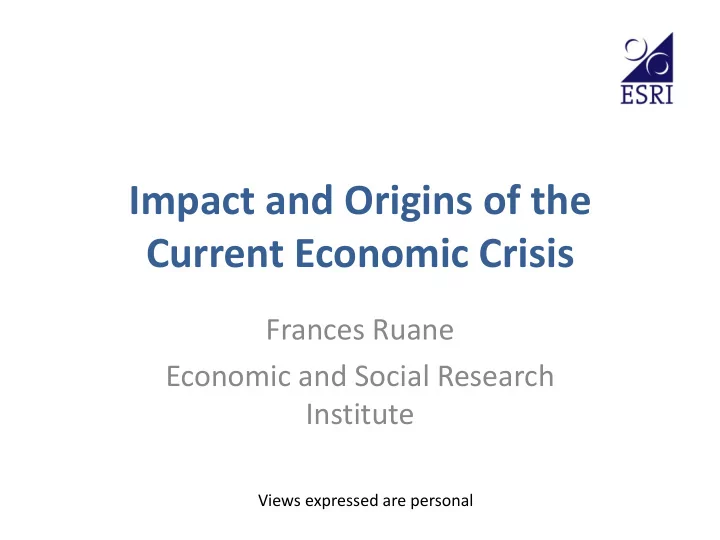

Impact and Origins of the Current Economic Crisis Frances Ruane Economic and Social Research Institute Views expressed are personal
Introduction • Crisis has had a major negative impact on income and employment, and a still larger negative impact on unemployment rate and numbers – See Figure 1. • Key specific failures – Weak evolution of good governance – Weak enforcement of regulations – Culture of openness not developed – Over-emphasis on consensus • Look at how individuals/organisations are being affected
Fig 1:Income Per Capita 1997-2011 50 45 40 35 30 GDP constant prices GNP constant prices 25 GDP current prices 20 GNP current prices 15 10 5 0 1995 1996 1997 1998 1999 2000 2001 2002 2003 2004 2005 2006 2007 2008 2009 2010 2011
Which Groups? • Consumers • Employees • Enterprises • Civil service • Politicians • Banks
Impact of the Crisis 1 Rebuilding Exposed to Challenging balance sheets housing debt for the young due to over- with increases borrowed in wages Consumers Employees unlikely Personally Frustrated Precautionary Older – OK if Saving not in bank shares or Facing very with pension Many heavily weak risk over-borrowed Enterprises domestic markets SMEs facing credit constraints
Impact of the Crisis 2 Slow Challenging fiscal Tough Legislative deficit unpopular process decisions undermines Civil Politicians reputation Service Perceived loss of trust/ Magnified reputation Challenge of reform managing challenge different Mixed audiences Massive scale of message for adjustment behaviour Banks needed Loss of Reputation
Triggers of Crisis International • Rapid global integration of financial markets without adequate global governance/oversight • Creation of Euro without adequate scoping of regulatory/prudential requirements National • Inadequate regulation of domestic Irish Banks Were there any elements specifically Irish?
Elements in the Crisis Use the same groups as previously to look at behaviours in lead up to the crisis : • Consumers • Employees • Enterprises • Civil service • Politicians • Banks
Key Elements in the Crisis 1 Presumed Excessive Presumed tax borrowing income reductions increases Consumers Employees Naive presumptions Failure to about house/ Presumed understand share prices skill sets finances were Made risky adequate Focused on investments short-term Enterprises gains Underinvested in human capital, innovation, technology, export marketing
Key Elements in the Crisis 2 Failure to Ignored Failure to appreciate signals re reform fully risk to housing planning and revenue market/pro- legislative base cyclical policy Civil Politicians processes Service Inadequate collection/ Inadequate use of data Discouraged systems for debate and ensuring difference efficient Unbalanced Reckless spending loan book competition for Banks market share Ignored Risk-inducing history of remuneration relationships Inadequate systems governance
Suggestion: Do not waste the opportunity created by this crisis! Give serious attention to: Governance Legislation/Regulation Enforcement Human Behaviour
Recommend
More recommend